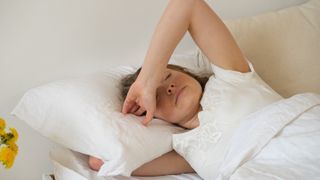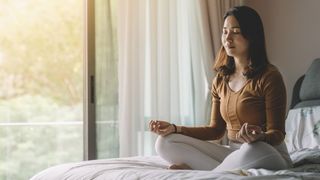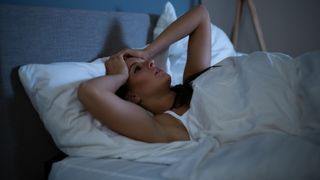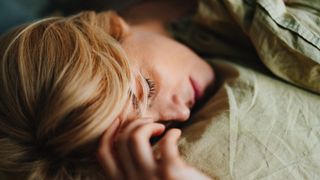This Menopause Awareness Month, a new study has found that 80% of people going through perimenopause experience difficulty sleeping. The study also found that 90% of women in this phase experience anxiety while 71% have night sweats, with both of these symptoms affecting sleep.
Ironically, the researchers behind the study also discovered a positive relationship between sleep duration and perimenopausal symptoms, finding that that perimenopause symptoms caused by low estrogen were reduced with more sleep during a recent study.
So, how are those experiencing perimenopausal symptoms supposed to get more sleep to improve the symptoms, when one of the main symptoms is difficulty sleeping? We've spoken to the expert behind the studies, Oova founder Dr Amy Divaraniya, to find out. From bedtime routines to choosing the best mattress for your body, here are the top three things Dr Divaraniya recommends you do to sleep better tonight.
What is perimenopause?
Perimenopause, Dr Divaraniya explains, is the period where you transition from your reproductive years into menopause (the permanent end to having menstrual periods) which can bring about physical and emotional symptoms.
"Women have a menstrual cycle to optimize the chances of getting pregnant," she tells us. "Hormones dictate that menstrual cycle by communicating in synergy together. Now, we obviously cannot get pregnant at 70 — we shouldn't be.

"It's not healthy and not good for evolutionary needs. So, at some point our bodies starts to tell us we're not going to get pregnant anymore. But what happens during perimenopause is the body is not trying to transition out of wanting or being able to get pregnant, and that causes hormonal imbalance."
The 3 things you can do to get better sleep during perimenopause

1. Establish a bedtime routine
Dr Divaraniya says the first step to getting more sleep is through making lifestyle changes, including establishing a consistent sleep routine to improve sleep hygiene.
A good sleep routine will also help to reduce anxiety, another symptom of perimenopause that can impact sleep. Take any screen time away before bed and practice meditation, bedtime yoga, and breathing exercises. Those kinds of things help reduce the stress in your mind before you go to bed to ensure that you're getting good sleep.
2. Create a cool environment
Along with anxiety, the study also found that 71% of perimenopausal women experienced night sweats, so Dr Divaraniya keeping your bedroom cool is a must if you want to sleep better.
"If you're sweating a lot at night, or if there's things that you're noticing are impacting the way that you're sleeping on a regular basis, there are solutions out there that you should embrace," she says. "The best cooling mattress is great because it literally will make you sleep better. There's also keeping the room cool at night, sleeping with a fan on - all simple lifestyle changes that you're able to do to address the discomfort that you're experiencing."
If investing in a new cooling mattress is outside of your budget, you can always buy a cooling mattress topper or a cooling mattress protector. Our best mattress toppers guide is full of bed toppers with cooling features, and you can also check out our guide on how to keep your bedroom cool.

3. Pay attention to your estrogen levels
"All of those symptoms are driven by an imbalance of your estrogen, so anything that's going to help get your estrogen progesterone in balance will help induce better sleep at night," the doctor tells us.
"Look at what your estrogen levels are on a daily basis to check to see if your estrogen is actually really low. If it is, you'll want to get it higher. But if your estrogen is fine, and if you're still cycling there could be other things causing sleep issues."
If your estrogen levels are low and it's clear that perimenopause is to blame for sleep disruptions, Dr Divaraniya advises considering Hormone Replacement Therapy (HRT): "HRT directly addresses the reduction in estrogen that happens if you get less sleep.
"You'd have to discuss that with your doctor, but it's definitely an option, and our results are showing that if you can get that estrogen to a good spot before bedtime, you could expect to have a better night's sleep."
How does perimenopause affect sleep?
Dr Divaraniya's research has shown that this hormonal imbalance brought about by perimenopause presents itself through side effects you can outwardly experience, such as sleep issues.
"It's because the hormones that your body is used to working in a certain way are not working that way anymore," explains the perimenopause expert. "It's reacting, and when there's a lot going on, you're not going to be able to sleep.
"It also shows itself in other symptoms, like a night sweats or anxiety, and these outward symptoms that are really drastically driven by hormonal imbalance."
How does sleep affect perimenopause?
According to Divaraniya's research, there's a positive relationship between sleep duration and estrogen levels in perimenopausal women. Increased sleep leads to increased estrogen levels, which in turn improves menopausal symptoms.
Participants in the study who slept between six to nine hours showed increased estrogen, as opposed to those who slept between three to six hours, which suggests that perimenopause symptoms caused by low estrogen could be reduced with more sleep.

"What we're seeing is that their estrogen levels actually drop pretty substantially when you get less sleep, and they're a bit more elevated when you're getting enough hours of sleep," the founder of Oova explains.
"So six to nine or nine plus, it's like the sweet spot. You want to be above six hours of sleep to see that estrogen level be at a point where it's probably subduing a lot of the symptoms that you're experiencing that would cause you to wake up."





















 English (US) ·
English (US) ·